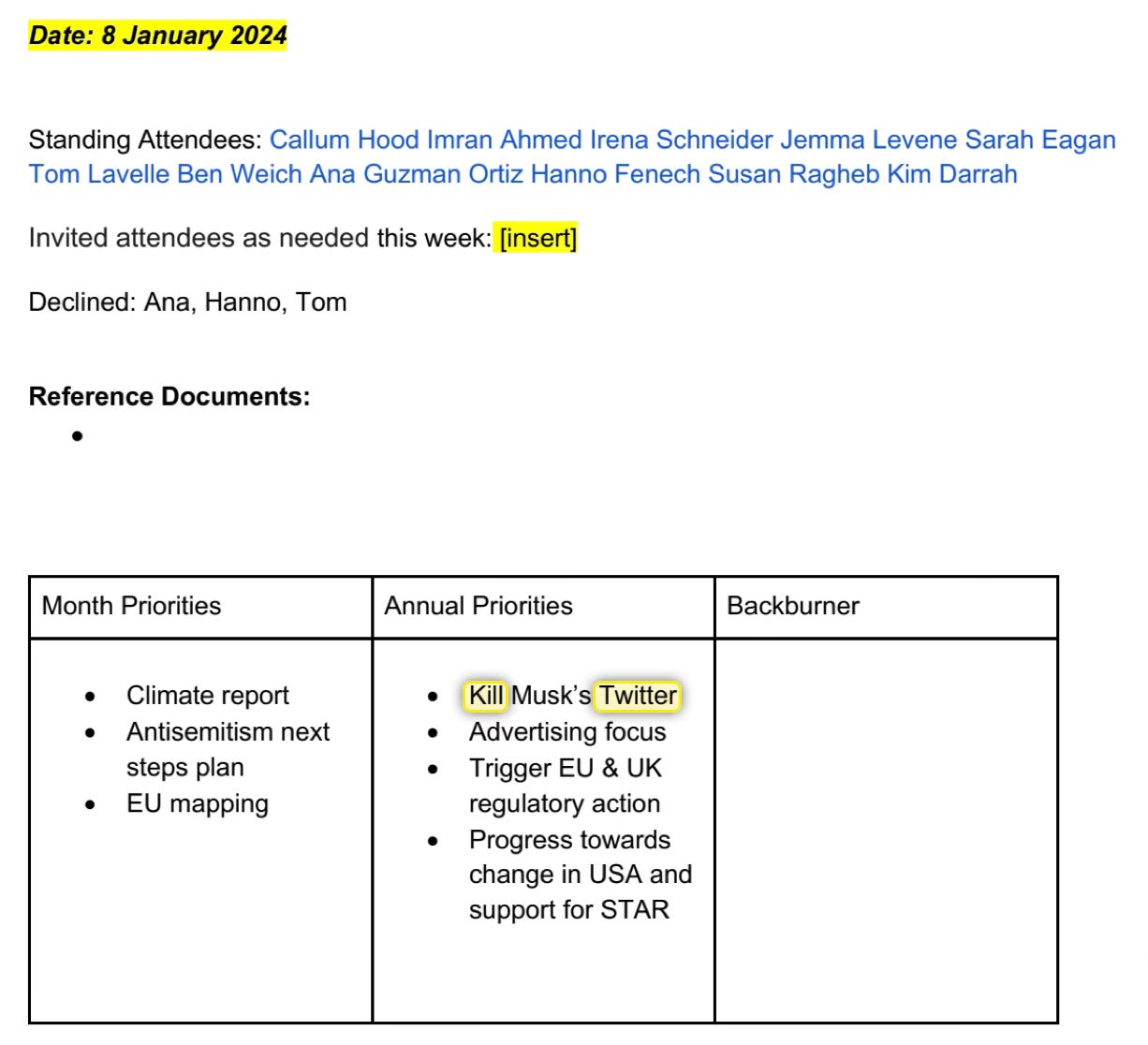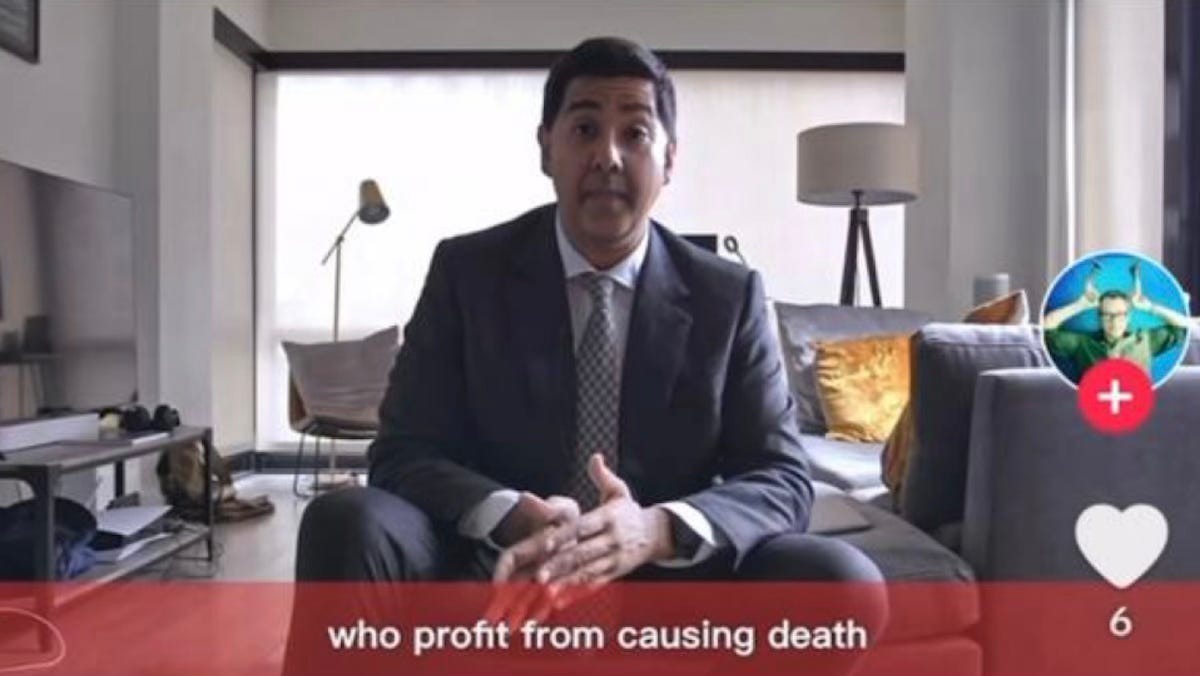Unmasking CCDH’s Memo: A Closer Look at Concerning and Potentially Illicit Activities
Leaked CCDH memos expose covert operations, censorship agendas, and election interference tactics that threaten the very fabric of free speech and democracy.
A series of revelations has cast a harsh light on the Center for Countering Digital Hate (CCDH), an organization that markets itself as a guardian against online harm. The organization, already under scrutiny following a Congressional investigation into its role in labeling critics of official narratives as the so-called "Disinformation Dozen," is now facing further questions about its strategies and intentions. Recent reporting by Children’s Health Defense and GreenMedInfo has exposed CCDH’s deep connections to government and corporate power structures, and its alleged role in promoting censorship under the guise of combating hate.
A leaked internal memo from CCDH provides a rare glimpse into its inner workings. It reveals a range of tactics that, far from being limited to advocacy, appear to extend into the realm of covert influence, manipulative media strategies, and potentially unlawful activities. The memo aligns disturbingly with broader efforts by global elites to suppress dissent, as outlined in GreenMedInfo’s exposé on the “Kill Musk’s Twitter” directive and NATO’s digital “black ops.” Together, these revelations suggest a coordinated attempt to silence voices that challenge dominant narratives on health, free speech, and governance.
This article dissects the most concerning aspects of the leaked CCDH memo, highlighting activities that raise serious ethical and legal questions.
1. Mention of "Black Ops" Against RFK Jr.
Excerpt:
"RFK - black ops being set up to look at RFK. Nervousness about the impact of him on the election."
Why It’s Concerning:
The memo’s casual reference to “black ops” targeting Robert F. Kennedy Jr., a prominent voice for medical freedom and a 2024 presidential candidate, raises alarms. The term implies clandestine and deniable actions designed to discredit or disrupt RFK Jr.’s campaign, likely in the form of digital propaganda or narrative manipulation.
Such tactics echo the military-grade psychological operations highlighted in GreenMedInfo’s investigation into NATO’s use of “digital black ops” to manipulate public opinion.
Implications: If CCDH is coordinating or supporting such operations, it could violate laws protecting election integrity and raise constitutional issues surrounding freedom of expression and political participation.
2. "Kill Musk’s Twitter" as a Strategic Priority
Excerpt:
"Kill Musk’s Twitter" appears repeatedly under "Month Priorities."
Why It’s Concerning:
This directive reflects a coordinated campaign to undermine Twitter (now X), with the apparent goal of silencing voices critical of dominant narratives. As GreenMedInfo has reported, the “Kill Musk’s Twitter” agenda aligns with broader censorship efforts tied to international regulatory bodies and corporate interests.
The language of “kill” implies an intent to destroy the platform, raising questions about CCDH’s methods. Could this involve misinformation campaigns, regulatory pressure, or economic sabotage?
Implications: Such actions, if realized, could constitute tortious interference with business operations, anticompetitive behavior, or even cybercrime.
3. Manipulation of AI-Generated Content
Excerpts:
"Get names of candidates (Trump/Biden) and test willingness of different AI tools to generate, e.g., Trump meeting KKK, Biden meeting terrorists."
"Put any generated images out with a CCDH/Fake watermark."
Why It’s Concerning:
The deliberate creation of fabricated AI content involving political figures demonstrates a willingness to exploit emerging technologies for manipulative purposes. Labeling these as “fake” does little to mitigate the risk of misuse, as such content can be easily repurposed by bad actors.
The memo also discusses using AI-generated audio recordings to highlight the dangers of deepfakes, but the potential for this material to be misinterpreted or weaponized is high.
Implications: Generating and disseminating false media about public figures could violate defamation laws, election interference statutes, and ethical norms surrounding the use of AI.
4. Coordinated Efforts to Influence Policy and Regulation
Excerpts:
"Trigger EU & UK regulatory action."
"Push the UK more on voluntary AI commitments."
"Meetings with Klobuchar’s team to seek a quote/press release endorsement."
Why It’s Concerning:
CCDH’s strategy to “trigger” regulatory action suggests a proactive attempt to manipulate government policies rather than engaging in good-faith advocacy.
As highlighted in GreenMedInfo’s analysis of NATO employee Dr. Charles Kriel, such tactics may be part of a larger agenda to align global regulatory frameworks with corporate and geopolitical interests.
Implications: Undisclosed lobbying efforts or misleading government officials could breach lobbying transparency laws and ethical standards for nonprofit advocacy.
5. Covert Partnerships and Influence Campaigns
Excerpts:
"Shadow ministers on lords Clement Jones embassy person in DC?"
"Could a political journalist be used?"
"Partner ords like Danny Stone?"
Why It’s Concerning:
These vague references to partnerships with political figures, journalists, and civil society organizations suggest covert collaborations to advance CCDH’s agenda. Without transparency, such activities risk undermining public trust.
Implications: If these partnerships involve financial ties or undisclosed collaborations, CCDH could face scrutiny for violating transparency regulations and ethical norms.
6. Election Interference Strategies
Excerpts:
"Audit of platforms and AI tools... test features—e.g., monetisation, verified accounts, look at different tools to see how easy to generate text or images that can contribute to election disinformation."
"Targeting of female candidates and other marginalised groups."
Why It’s Concerning:
CCDH’s involvement in “testing” tools for generating election misinformation and targeting specific demographics (e.g., female candidates) raises ethical and legal red flags.
Implications: Direct participation in election-related misinformation could lead to allegations of election interference and harm CCDH’s credibility as a watchdog.
7. Deplatforming and Censorship Campaigns
Excerpts:
"Deplatform Libs of TikTok."
"Antisemitic Facebook admins—when you report a post, admins will remove it and then block you from the group."
Why It’s Concerning:
CCDH’s focus on deplatforming specific individuals and groups, while aligned with its mission, risks being perceived as selective censorship. This undermines free speech principles and raises questions about who decides what constitutes “hate.”
Implications: Coordinated efforts to silence dissenting voices could expose CCDH to accusations of bias and overreach, particularly if such campaigns lack transparency.
Conclusion: A Call for Accountability
The leaked CCDH memo, coupled with ongoing investigations and exposés, paints a troubling picture of an organization that appears willing to employ aggressive, covert, and potentially illegal tactics to achieve its goals. From "black ops" against RFK Jr. to the “Kill Musk’s Twitter” directive, CCDH’s activities suggest alignment with broader censorship and influence campaigns tied to powerful global interests.
Their recent decision to leave X, along with their CEO Imran Ahmed’s deleting his personal account, indicates a seismic shift is underway.
These revelations demand a thorough investigation into CCDH’s operations and accountability for any violations of law or ethics. As the public grows increasingly aware of these tactics, a larger question emerges: How much power should unelected organizations wield in shaping the narratives of our time?
The answer may well determine the future of free speech and democracy.







Shut CCDH down. They engaged in clearly political behavior while they filled as a non-political nonprofit for tax purposes. Kick them out of the country and deny them all visas to return. Game over.